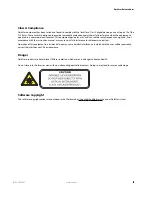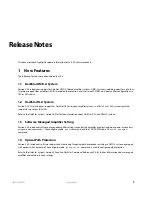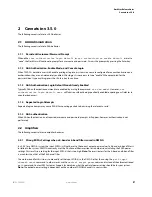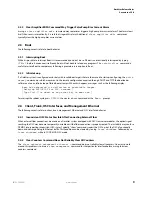
DarkStar Release Notes
Caveats in v3.5.0
6
50103-50203-51
www.xkl.com
2.5.5 SSH Sessions and System Performance
An active SSH session may impact system performance. The impact may also increase in proportion to the number of active
sessions. For time-consuming operations, such as TFTP transfers of large files, minimizing the number of active SSH sessions
may improve system performance.
2.5.6 SSH Message
During SSH connections, the message
server_request_session: channel_new failed
or the message
VTY
allocation request failed on channel 0
may be printed to the console. They can safely be ignored.
2.5.7 Command History Retention
If a user issues enable mode commands, and then exits enable mode but does not exit the console session, the enable mode
command history may be visible for a period at the console. Explicitly exiting the console session removes the command
history. You can explicitly exit the console session with an
exit
,
logout
, or
do logout
command.
2.6 Monitoring
The following caveats relate to monitoring DarkStar systems and networks.
2.6.1 Debug Reporting Errors
Enabling debug output in scenarios that generate large amounts of debug output may result in messages containing many
dropped characters after a saturation level to the output buffer is reached. Turning off debug modes with
undebug all
will
return the system to normal.
2.7 SNMP
The following caveats relate to SNMP behavior.
2.7.1 SNMP Trap Indicates "Down" when EDFA Case Temp is High
In the unlikely situation where an erbium-doped fiber amplifier (EDFA) case temperature is sufficiently elevated, an SNMP trap
may be generated indicating that the EDFA is down. Elevated case temperature alone is not sufficient to cause an EDFA to
shutdown, so it is likely the case that the EDFA remains up and functioning.
The cause of the high temperature should be investigated. Possible causes include elevated ambient operating conditions,
cooling fan failure, and so forth..
2.7.2 Loopback Reporting
The loopback interface is not reported by SNMP.
2.7.3 SNMP Trap Logging
During system start up, SNMP traps and syslog messages may not be received because the network routes required to send
the traps are not yet initialized.































